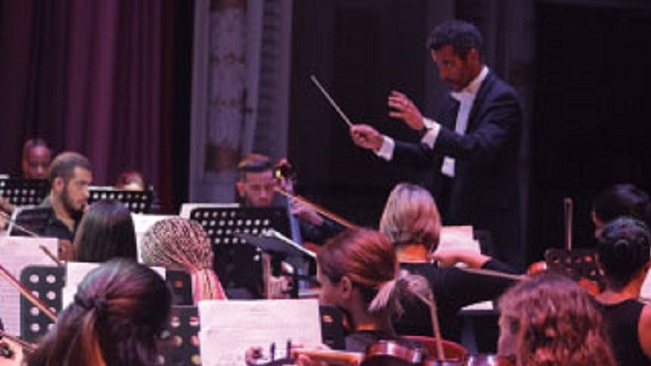Rent, Pulitzer Prize for drama in 1996, winner of a Tony in 1997 for best musical, arrives in Cuba
I confess I came to the theater somewhat unbelieving and without much expectation. Maybe I was moved by the fact that a proposition of this generic nature returnd to the Cuban scenarios after so long. Even though Rent is one of those musicals with thematic framework and without conflict facts, which protects the outline of the characteristics of its characters and putting them in vision the attraction-, in this Havana Rent there are certain qualities worthy of consideration.
Rent, Pulitzer Prize for drama in 1996, winner of a Tony in 1997 for best musical, among other rewards, comes to Cuba as a continuation of exchanges initiated in 2011 with Nederlander Worldwide Entertainment to bring artistic Broadway productions to Cuban scenarios.
Conceived in two acts and respecting the uncompromising of the original script, with music and lyrics by Jonathan Larson, the proposal released in Tito Junco hall of the Bertolt Brecht Cultural Complex is directed by Andy Señor Jr., who was in the original cast of the play in New York, playing one of the protagonists of the piece. To Michael Greif, original director of Rent, Señor had talent to serve as associate director in the Off-Broadway productions of the piece.

A working team, heterogeneous in its origin, took over the production of the show: actors, singers, dancers, wizards, designers, musicians, managers, consultants and technicians joined from generated casting to the montage.
I think there might be one of the special values of the show: the fact that young people with diverse backgrounds, experiences and diverse artistic skills expertly succeeded in solving their respective roles.
Do not forget that for Cuban youth team, the rich history and scenic excellence of musical theater once produced in Cuba is part of a not always well-told legend. The slowdown or loss of this tradition continues to weigh on the artistic achievement and the critical and historiographical memory of our theater.
Hopefully, as Gisela Gonzalez, president of the National Council of Performing Arts Cuban and counterparty of the project pointed, Rent constitutes a fundamental step for musical theater in Cuba. It is possible to combine the Cuban talent with the long history of Broadway as an art form. This collaboration brings us and hopefully we will get an authentic product of high quality, which will lead to future joint projects.
The recreating story of Rent, focused on the history and faith of life of a group of young artists and bohemians who lived in the early nineties, hardly living and challenged the rent, which gathered around crosses, occasional adventures, drugs, love and AIDS is compelling wink to the reader-viewer, of how the theater is the magnification lens that when appropriating of reality can become denunciation of the intricacies of life, of everyday life, transactions and utopias.
 For Angel, Roger, Mark, Joanne, Maureen and Mimi, type characters in the cumulative fable of Rent, go through life without giving up dreams, desires, stubbornness, is will under the authorial conception of Larson. "Measure your life in love," says the leitmotif of its writing and behavior of the characters, situations solving and conflict resolution. They, the characters, are circumstantial archetypes of a society which, exhausted, frantic in its supposed "good manners" is vivid and tangible in its itineraries. Whether east of New York or any other cardinal point, I feel the desire to be happy to be the center of our lives and our actions.
For Angel, Roger, Mark, Joanne, Maureen and Mimi, type characters in the cumulative fable of Rent, go through life without giving up dreams, desires, stubbornness, is will under the authorial conception of Larson. "Measure your life in love," says the leitmotif of its writing and behavior of the characters, situations solving and conflict resolution. They, the characters, are circumstantial archetypes of a society which, exhausted, frantic in its supposed "good manners" is vivid and tangible in its itineraries. Whether east of New York or any other cardinal point, I feel the desire to be happy to be the center of our lives and our actions.
I confess: I left the theater with great enthusiasm, happy for the responsibility of the creative team and happy for the public reaction.
While I maintain that Rent, during its more than two hours of duration, revels in hypertext of its associations, links and figurative story, is valid to point out the woven complicity between visual, sound, spatial sense, even when it would seek to insist on necessary training of its performers. In musical theater there is a peculiarity of assuming the role from a total globalizing kinesis of the face sense of acting. Beyond the characteristics of the character, beyond the spectacular notion, avoiding potential platitudes and local color, the musical comedy would require a poetic of generosity that makes his role a seductive vector for the reader-viewer.
I left excited by the work of Cuban managers who are partners to the project for the craftsmanship of the artists and technicians and who worked full time effectively in the realization of the staging of Rent. I welcome the generosity of the producers of Broadway and American creative team of the piece. Now, after my expectation became hope in the well-intentioned recovery and artistic musical theater, let’s hope our filmmakers return to the "orgiastic" sense of the genre, simply because after the Cuban premiere of Rent: the show must go on!
Related Publications

How Harumi Yamaguchi invented the modern woman in Japan
March 16, 2022
Giovanni Duarte and an orchestra capable of everything
August 26, 2020











